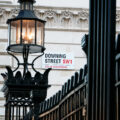Interfaith dialogue may be the Church of England’s greatest strength
Interfaith dialogue may be the Church of England’s greatest strength
The Church of England is making headlines for all the wrong reasons. Our analyst Frazer MacDiarmid says their openness to interfaith dialogue may be their saving grace.
This weekly comment was written by Frazer MacDiarmid and reflects his personal analyses and opinions, rather than those of EARS.
The Church of England (CoE) has a fine tradition of respectful and deliberate engagement with other religions. Though sometimes challenging, good interfaith dialogue is a win-win. It sparks greater understanding and empathy with strangers and aids cross-society collaboration. Done well, speaking with other religions also helps believers understand their own faith more deeply and promotes intra-faith unity.
But the CoE currently finds itself in the headlines for negative reasons, from bitter factionalism to safeguarding woes to culture wars. This begs the question: is the Church better at speaking with other faiths than with itself? And can interfaith engagement teach it how to keep its own house in order?
A tradition of interfaith dialogue
Since at least the Roman Catholic Church’s doctrinal reforms of the 1960s, the CoE has shared a rich (though not uncomplicated) relationship with Rome. The two denominations have much in common: an emphasis on the liturgy, the Eucharist, and tradition.[1] Pilgrimages between Canterbury and Rome, led by bishops from both sides, symbolise enduring links.[2]
The CoE’s amicable relations with the Eastern Orthodox Church date back to at least the early 20th century. Many Orthodox Christians fled Russia for England during the 1917 revolution, and found a home in the Anglican liturgy.[3] Regular conferences and exchanges keep the relationship vital,[4] though recently Russia’s invasion of Ukraine has caused tension.[5]
Though disagreeing with these denominations on issues such as the ordination of women, the veneration of icons, and the primacy of Rome, the CoE has maintained a high level of dialogue and engagement. The recently established Anglican Interfaith Commission coordinates efforts to “bring mutual understanding and to build trust between different faith groups” – work the archbishop of Canterbury describes as “essential.”[6]
Recent interfaith engagement
Even in 2023, interfaith dialogue appears to remain a priority for the CoE. Lambeth Palace, the residence and offices of the Archbishop of Canterbury, regularly hosts interfaith events. In July, Archbishop Justin Welby met with members of the Sikh community to talk about “joys and concerns” of those people of faith.[7] In late 2022, Welby welcomed the Chief Rabbi and others from the Jewish community as part of the ‘In Good Faith’ project, pairing CoE priests with rabbis. “Friendships across faiths are so important in our world today,” he wrote.[8]
The coronation of King Charles III in May showcased an English church and king deeply aware of their country’s religious diversity. While the service itself was held according to a CoE liturgy, it bore strong interfaith elements.[9] Members from all the major faiths spoke (if briefly), and Jewish, Sunni and Shia Muslim, Sikh, Buddhist, Hindu, Jain, Bahá’í, and Zoroastrian representatives participated in the procession.[10]
As head of the Church, whose official title includes the phrase Defender of the Faith, King Charles’ openness towards interfaith dialogue is important. Shortly after the queen’s death, he described himself as a “committed Anglican” but that as sovereign he had a “duty to protect the diversity of our country, including by protecting the space for faith itself and its practice through the religions, cultures, traditions and beliefs to which our hearts and minds direct us as individuals.”[11]
Church of England in disarray
But in 2023 the CoE finds itself confronted with numerous challenges threatening to overwhelm it.
Most destructive is the infighting among CoE members, of which factions appear on several key issues: same-sex marriage,[12] the ordination of women,[13] [14] and a host of other culture-war flashpoints.[15] [16] The Archbishop of Canterbury this year officially lost the confidence of a prominent conservative CoE splinter group.[17]
Abuse of children and other vulnerable people has stalked the CoE for decades.[18] Efforts to improve safeguarding and provide compensation to survivors of abuse have been blighted with errors, drawing vocal criticism of the church’s hypocrisy.[19] Most recently, two members of the Independent Safeguarding Board were sacked, further damaging trust.[20]
Perhaps the most existentially threatening challenge is the CoE’s dwindling membership,[21] and no unified plan for how to solve it.[22]
Teach yourself
The CoE is in many ways an organisation in disarray, especially judging from the headlines. Interfaith engagement, although rarely front-page news, is perhaps its greatest strength. It reveals a belief in the power of dialogue to forge connections across divides. It shows a church comfortable with difference, not as a problem to be solved, but a strength to be celebrated.
Amidst the various challenges facing it, the CoE should begin by addressing its internal divisions. A problem that has existed since earliest Christianity,[23] difference within the church should be approached in the same way as interfaith dialogue: value hard conversations; begin talking without the intention to persuade but to understand; find solidarity as people of faith in a secular world; and be open to criticism while remaining true to Christian principles.
The CoE succeeds at interfaith dialogue because of the values it adopts to engage in it: patience, vulnerability, active listening, charity, but ultimate strength in their own convictions. If the CoE applied these same principles to its other problems, it might find itself making headlines for the right reasons.
This weekly comment was written by Frazer MacDiarmid and reflects his personal analyses and opinions, rather than those of EARS.
Our team of analysts conducts daily research on religion and society. Learn more on the EARS Dashboard.
Sources
[1] Anglican-Roman Catholic Dialogue
[2] New steps on an ancient pilgrimage: Together from Canterbury to Rome
[3] Anglican-Orthodox and Anglican-Roman Catholic Theological Dialogue
[4] The International Commission for the Anglican-Orthodox Dialogue
[5] Archbishop tells head of Russian Orthodox Church of ‘grave concern’ over Ukraine
[6] Anglican Interfaith Commission
[7] Guru Nanak Gurdwara Smethwick news
[8] Archbishop of Canterbury tweet
[9] King Charles’s Coronation Will Honor Interfaith Dialogue With a Special Gift From Pope Francis
[10] With interfaith elements in the coronation, King Charles III will promise to defend the Church of England as the state religion
[11] Defender of all faiths? Coronation puts focus on King Charles’s beliefs
[12] Divided Church of England to debate blessings for same-sex unions
[13] Why women’s ordination cannot be tolerated
[14] Why are female clergy cheering for a bishop who doesn’t believe in female priests?
[15] Church of England defends teaching controversial race theory
[16] Lord Boateng: Church’s racial-justice progress is slow, despite accusations of haste
[17] Conservative Anglican group says it has no confidence in Church of England leader
[18] Independent Inquiry into Child Sexual Abuse
[19] Church of England failures ‘allowed child sexual abusers to hide’
[20] Safeguarding in ‘crisis’ in Church of England, says archbishop of York
[21] Archbishop of Canterbury says decline in church attendance is ‘personal failure’
[22] According to the census, we’re now a land of many faiths. There is no place for an established church






